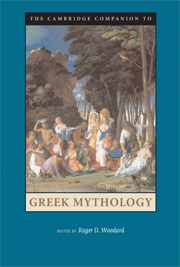Book contents
- Frontmatter
- Introduction: Muthoi in Continuity and Variation
- Part I Sources and Interpretations
- 1 Lyric and Greek Myth
- 2 Homer and Greek Myth
- 3 Hesiod and Greek Myth
- 4 Tragedy and Greek Myth
- 5 Myth in Aristophanes
- 6 Plato Philomythos
- 7 Hellenistic Mythographers
- Part II Response, Integration, Representation
- Part III Reception
- Bibliography
- Index
7 - Hellenistic Mythographers
from Part I - Sources and Interpretations
Published online by Cambridge University Press: 28 March 2009
- Frontmatter
- Introduction: Muthoi in Continuity and Variation
- Part I Sources and Interpretations
- 1 Lyric and Greek Myth
- 2 Homer and Greek Myth
- 3 Hesiod and Greek Myth
- 4 Tragedy and Greek Myth
- 5 Myth in Aristophanes
- 6 Plato Philomythos
- 7 Hellenistic Mythographers
- Part II Response, Integration, Representation
- Part III Reception
- Bibliography
- Index
Summary
From sometime in the fourth century BC on, Greeks developed an interest in collecting, documenting, and interpreting the important literary works of their past. The central texts to which they devoted much of their energies were the Homeric epics, the Iliad and Odyssey, but these were not the only ones. They also acquired the works of the lyric poets, tragedians, comedians, orators, historians, and philosophers. The centers for these projects became the great libraries of antiquity, most notably in Alexandria and Pergamum, but there were others, including some that focused on philosophical texts. Scholars who worked in these libraries faced a monumental task of organizing the texts, before they could begin real study of them. As part of their initial work, they had to create a catalog of the collection, which may be the reason for one of two lists that Callimachus, an Alexandrian scholar and librarian of the third century BC, was said to have composed, in addition to his learned poetry: Tables of Illustrious Persons in Every Branch of Learning Together with a List of their Works. This seems to have been some sort of catalog to the holdings of the Alexandria Library, though the fragments are so brief and so few that it is difficult to be certain.
Once these preliminaries were complete, though additions to the libraries, particularly that in Alexandria, continued for centuries, scholars could turn their attention to studying the works themselves. The texts reflected an often double transmission, since many had probably survived through both oral transmission and then as written documents that had been copied and recopied in different cities, by different scribes with varying abilities, and for many purposes.
- Type
- Chapter
- Information
- The Cambridge Companion to Greek Mythology , pp. 237 - 254Publisher: Cambridge University PressPrint publication year: 2007
- 7
- Cited by



